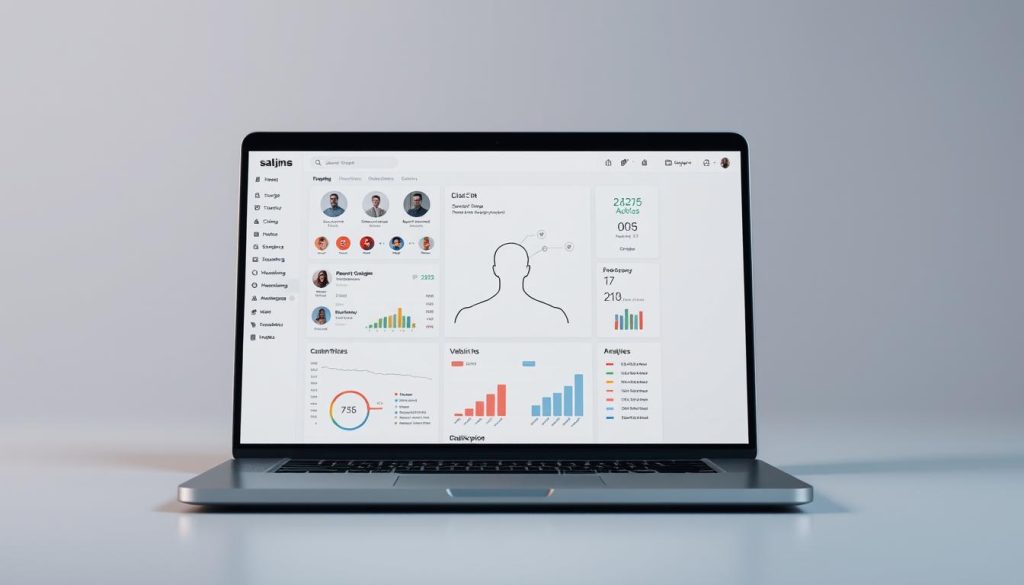Are you leveraging your digital footprint to its full potential to advance your career? In today’s digital-first world, having a professional online presence is no longer a choice but a necessity for career stability and growth.
With 97% of consumers turning to the internet to research local businesses, it’s clear that a significant portion of your professional opportunities may depend on your digital visibility. A well-crafted business strategy that includes a robust website and engaging content can be the key to unlocking new customer relationships and career opportunities.
Developing a strategic presence involves understanding the fundamental components that make up a strong digital identity. This includes creating a cohesive brand that resonates with your target audience and leveraging various digital media platforms to showcase your professional value.
Table of Contents
Key Takeaways
- Understand the importance of a professional online presence for career advancement.
- Learn how to assess and improve your current digital footprint.
- Discover practical steps to build a cohesive digital strategy.
- Find out how to leverage digital platforms to showcase your expertise.
- Gain insights into creating a professional brand that resonates with your audience.
Understanding the Power of Online Presence in Career Development
A strong online presence can significantly impact your career development and professional growth. In the digital age, your online presence is tied to your visibility, credibility, and reputation. Without a strong online presence, you risk being overlooked in the competitive job market.
What Defines a Strong Online Presence
A strong online presence encompasses all your digital touchpoints, including your personal website, social media profiles, content publications, and professional listings. It’s about creating a cohesive professional narrative that showcases your expertise and value proposition. Your digital presence is more than just existing online; it’s about making a meaningful impact.
- Your personal website serves as a central hub for your professional identity.
- Social media profiles help you engage with your audience and build your brand.
- Content publications demonstrate your expertise and thought leadership.
- Professional listings ensure you’re visible in industry-specific directories.
Why Online Presence Matters for Professional Growth
In today’s competitive job market, employers routinely research candidates online before making hiring decisions, making your digital footprint a crucial element of your professional identity. A well-crafted online presence allows you to control the narrative around your professional brand and actively shape how you’re perceived in your industry.
The visibility that comes with a strong online presence creates opportunities for networking, partnerships, and career advancement that might otherwise remain inaccessible. Your online presence serves as a 24/7 professional ambassador, working on your behalf even when you’re not actively job searching or networking.
By strategically managing your online presence, you can stand out in your field by highlighting your unique skills, experiences, and professional perspective. This not only enhances your credibility but also opens up new avenues for professional growth and development.
Assessing Your Current Online Footprint

Evaluating your digital footprint helps you identify areas for improvement in your online presence strategy. In today’s digital age, having a strong online presence is crucial for career development and professional growth.
To start, you need to understand how you appear online. This involves a thorough examination of your current digital presence.
Conducting a Personal Online Audit
Begin by conducting a personal online audit to understand your current digital footprint. This involves:
- Searching for yourself using various search engines in incognito mode to see what potential employers or clients would find.
- Evaluating all existing profiles and content associated with your name, noting inconsistencies or outdated information.
- Assessing the quality and relevance of your existing content to determine what should be updated or removed.
By doing so, you can identify areas that require improvement and create a more cohesive professional online identity. For more insights on finding clients online, you can refer to strategies for finding clients online.
Identifying Gaps and Opportunities
Once you have conducted your personal online audit, the next step is to identify gaps in your online presence and opportunities for growth. Compare your digital footprint to that of successful professionals in your industry to identify areas for improvement.
- Look for opportunities to expand your presence on platforms relevant to your industry.
- Document your findings systematically to create a baseline for measuring future improvements.
By identifying these gaps and opportunities, you can develop targeted strategies to enhance your online presence and strengthen your professional narrative.
Creating a Professional Website as Your Digital Hub
A well-designed professional website serves as a cornerstone for your online presence, offering a controlled environment to showcase your professional identity. With 75% of consumers judging a company’s credibility based on their website design, it’s clear that a high-quality website is essential for making a positive first impression.

Essential Elements of an Effective Personal Website
To create an impactful online presence, your website should include several key elements.
- Make sure your website design reflects your professional brand with a clean, modern aesthetic.
- Include essential pages such as an engaging about page, a comprehensive portfolio or work samples, a professional resume or credentials section, and accessible contact information.
- Incorporate testimonials, endorsements, or case studies that validate your skills and demonstrate the impact of your work to build credibility.
Optimizing Your Website for Professional Visibility
Optimizing your website for search engine visibility is crucial for improving visibility and reaching your target audience.
- Optimize your website content with relevant keywords related to your expertise and industry to improve visibility in search engine results.
- Ensure your site is mobile-responsive and loads quickly, as these technical factors significantly impact both user experience and search engine rankings.
- Regularly update your website with fresh content that demonstrates your ongoing professional development and thought leadership in your field, as part of your overall strategy.
Mastering LinkedIn for Career Advancement

As the premier professional networking site, LinkedIn offers unparalleled opportunities for career growth. With a robust online presence on LinkedIn, professionals can significantly enhance their visibility and reach a wider audience.
Crafting an Impactful LinkedIn Profile
Crafting a complete and impactful LinkedIn profile is the first step towards leveraging the platform for career advancement. This involves:
- Including a professional headshot that presents you in a professional light.
- Creating a compelling headline that captures your professional brand.
- Writing a keyword-rich summary that highlights your skills and experience.
- Detailing your experience sections with achievements rather than just responsibilities.
By optimizing your profile with industry-specific keywords, you ensure visibility in relevant searches by recruiters, potential clients, and professional connections, thereby strengthening your online presence.
Strategic Networking and Content Sharing
Building your network strategically is crucial. This involves connecting with colleagues, industry peers, thought leaders, and professionals who can provide opportunities for collaboration or career advancement. Regular engagement with your network through sharing valuable content, commenting thoughtfully on others’ posts, and participating in relevant industry groups and discussions is key.
Publishing original content on LinkedIn demonstrates your expertise, shares your professional insights, and establishes you as a thought leader in your field. Requesting and providing recommendations and endorsements builds social proof of your skills and strengthens your professional credibility on the platform.
By mastering these aspects of LinkedIn, you can effectively enhance your career prospects and achieve your professional goals through a strong online presence and strategic networking.
Leveraging Social Media Platforms Strategically
A strategic approach to social media can significantly boost your professional visibility and career opportunities. In today’s digital age, having a strong online presence is no longer optional but a necessity for professionals aiming to advance their careers or expand their business reach.
Choosing the Right Platforms for Your Industry
To maximize your online impact, it’s crucial to focus on the social media platforms where your target audience is most active. For instance, professionals in visual fields may find Instagram or Pinterest more beneficial, while those in academic or research-oriented fields might prefer Twitter or ResearchGate. By concentrating on the platforms that align best with your industry, you can optimize your online presence and engagement.
Creating Content That Showcases Your Expertise
Developing a content strategy that highlights your professional expertise is vital. This involves creating posts that not only demonstrate your knowledge but also provide value to your audience. By doing so, you position yourself as a credible and authoritative figure in your field, enhancing your professional brand and marketing your skills effectively.
Maintaining Professional Boundaries Online
It’s equally important to maintain a clear distinction between your professional and personal online presence. This can be achieved by either using separate accounts for professional and personal content or by carefully curating the content you share on platforms used for professional purposes. This helps in projecting a consistent and professional image to your audience, supporting your overall strategy.
By adopting a thoughtful and strategic approach to social media, professionals can significantly enhance their online presence, build meaningful connections, and advance their careers.
Developing a Strong Online Presence Through Content Creation

Content creation is the cornerstone of a strong online presence, enabling professionals to showcase their expertise and provide value to their audience. By developing a content strategy that addresses the needs and interests of your professional audience, you can establish yourself as a thought leader in your industry.
Blogging to Demonstrate Industry Knowledge
Starting a blog on your website or on platforms like Medium gives you a dedicated space to share in-depth insights on industry topics. To maximize the impact of your blog, focus on creating high-quality, engaging posts that address common questions or challenges in your field. Consistency is key; maintaining a regular publishing schedule helps keep your audience engaged and coming back for more.
To illustrate the effectiveness of blogging, consider the following statistics:
| Blogging Frequency | Traffic Increase | Lead Increase |
|---|---|---|
| Once a week | 1x | 1x |
| Four times a week | 3.5x | 4.5x |
By blogging regularly, you can significantly boost your website’s traffic and generate more leads.
Creating and Sharing Multimedia Content
Diversifying your content formats is crucial for reaching a wider audience. Incorporating videos, podcasts, infographics, or presentations into your content strategy caters to different learning preferences and increases your reach across platforms. Repurposing successful content across different platforms maximizes its reach and impact. For example, turning a blog post into a video tutorial or an infographic for social media can help you engage with your audience in various ways.
To effectively create and share multimedia content, consider the following strategies:
- Identify the most effective content formats for your audience.
- Develop a content calendar to maintain consistency.
- Utilize platforms like YouTube for videos and LinkedIn for professional networking.
Implementing SEO Strategies to Increase Visibility

To stand out in a crowded digital landscape, implementing effective SEO techniques is crucial for professionals looking to advance their careers. A well-crafted SEO strategy can significantly enhance your online visibility, making it easier for potential employers, clients, or collaborators to find you.
Keyword Research for Personal Branding
Conducting thorough keyword research is a foundational step in creating an effective SEO strategy for your personal brand. This involves identifying terms and phrases that are relevant to your expertise and the services you offer. By focusing on long-tail keywords that are specific to your niche, you can reduce competition and increase your chances of ranking well in search engine results.
Utilize tools like Google Keyword Planner or Ahrefs to find the most relevant keywords for your personal brand. For instance, if you’re a freelance writer, your keywords might include « content writer, » « SEO specialist, » or « blog writer. » Incorporating these keywords naturally into your website content, meta descriptions, and headings can improve your site’s visibility.
Optimizing Your Content for Search Engines
Once you’ve identified your target keywords, the next step is to optimize your content for search engines. This involves strategically incorporating your keywords into your website’s titles, headings, and body content. However, it’s crucial to maintain a natural, reader-friendly tone to avoid keyword stuffing.
Other key aspects of content optimization include ensuring your website has fast loading speeds, is mobile-responsive, and has proper indexing. Building quality backlinks to your content by guest posting on reputable industry sites or creating valuable resources can also enhance your search engine rankings. For more expert tips on boosting your search engine ranking, visit our guide on boosting your search engine ranking.
Building Credibility Through Online Directories and Listings
Building credibility through online directories and listings is a strategic move for professionals aiming to enhance their online presence. By listing your business or professional profile in reputable directories, you can increase your visibility and establish credibility among potential clients or employers.
With thousands of online directories available, creating listings for your business can help you appear in more search results. Links to your site from popular directories serve as local citations for your business, which Google considers when ranking your site. This not only improves your search engine ranking but also makes it easier for potential clients to find you.
Industry-Specific Platforms to Join
Identifying and joining industry-specific directories and professional associations is crucial. These platforms are where potential employers or clients often search for professionals with your expertise. For instance, creating a profile on directories like About.me or Linktree can serve as a hub that connects all your online presence elements.
- Identify industry-specific directories relevant to your profession.
- Join professional associations that align with your career goals.
- Create comprehensive profiles on general professional directories.
Optimizing Your Profiles Across Directories
To maximize the benefits of online directories, it’s essential to ensure consistency across all your listings. This includes maintaining the same name, professional title, contact information, and links to your website and social profiles.
| Directory | Profile Completeness | Consistency |
|---|---|---|
| About.me | High | Yes |
| Linktree | High | Yes |
| Crunchbase | Medium | Yes |
For more insights on enhancing your career as a freelancer, you can visit this resource on mission research for freelancers.
Managing Your Online Reputation Effectively
As a professional, your online reputation is a vital component of your brand that requires careful management. In today’s digital age, your online presence can significantly influence how you are perceived by potential employers, clients, or partners.
Effective online reputation management involves several key strategies. First, it’s essential to monitor your digital footprint regularly. This includes setting up Google Alerts for your name and its variations to stay informed about any online mentions.
Monitoring Your Digital Footprint
Regularly conducting searches for your name across different platforms helps identify content that might impact your professional reputation. This proactive approach allows you to address any negative content promptly and maintain a positive online image.
- Set up Google Alerts for your name and variations.
- Regularly search for your name across different platforms.
- Proactively collect and showcase positive testimonials and reviews.
Addressing Negative Content Professionally
Addressing negative feedback or content professionally is crucial. It demonstrates your commitment to customer satisfaction and your ability to handle criticism gracefully. By responding constructively to negative reviews, you can turn a potentially damaging situation into an opportunity to showcase your professionalism.
Key strategies include:
- Responding promptly to negative feedback.
- Addressing concerns in a professional manner.
- Showcasing positive testimonials to strengthen your credibility.
By managing your online reputation effectively, you can enhance your professional brand, build trust with your audience, and ultimately advance your career. Ensuring that your public social media activity aligns with your professional brand is also vital, as personal posts can impact how you’re perceived in professional contexts.
Measuring the Impact of Your Online Presence Strategy
Understanding the impact of your online efforts is key to refining your strategy. To maximize your professional visibility, it’s essential to assess the effectiveness of your online presence. This involves tracking various metrics and leveraging the right tools to monitor your online influence.
Key Metrics to Track
To evaluate the success of your online presence strategy, you need to identify and track key performance indicators (KPIs) that align with your professional goals. Some crucial metrics include:
- Website Traffic: Understanding visitor behavior and how people find your professional site using tools like Google Analytics.
- Engagement Rates: Monitoring likes, comments, shares, and other interactions on your content across social media platforms.
- Connection Growth: Assessing the quality and quantity of your professional network on platforms like LinkedIn.
- Lead Generation: Tracking inquiries, collaboration requests, or other tangible outcomes resulting from your online activities.
For instance, a significant increase in website traffic could indicate that your SEO efforts are paying off, while high engagement rates on social media suggest that your content resonates with your audience.
Tools for Monitoring Your Online Influence
Several specialized tools can help streamline the process of monitoring your online presence. These include:
- Hootsuite: For managing and analyzing social media presence across multiple platforms.
- Buffer: To schedule posts and track engagement metrics.
- BrandWatch: For comprehensive social listening and brand monitoring.
By leveraging these tools and focusing on key metrics, you can gain valuable insights into your online influence and make data-driven decisions to enhance your professional visibility.
Conclusion: Maintaining a Dynamic Online Presence for Long-Term Career Success
Building a lasting career requires a dynamic online presence that adapts to the ever-changing digital world. Your online presence is an extension of your professional brand, and it demands the same level of care and attention as your in-person operations.
To achieve this, it’s crucial to view your online presence as a long-term investment in your career. By doing so, you understand that the relationships and reputation you build digitally can create opportunities for years to come. This perspective helps you stay committed to maintaining a strong online presence that accurately reflects your professional values, expertise, and personality.
Several key strategies can help you maintain a robust online presence:
– Regularly review and update your online profiles to ensure they remain current and aligned with your evolving skills and professional goals.
– Stay informed about the latest digital trends and platforms in your industry to keep your online presence strategy effective.
– Balance your time investment across different platforms, focusing on channels that provide the greatest return for your specific professional objectives.
– Embrace the iterative nature of online presence management by using insights from your performance metrics to refine and improve your strategy continually.
By implementing these strategies and maintaining a genuine, professional online presence, you can attract and retain customers, build meaningful relationships, and drive long-term career success. Remember, a strong online presence is not a one-time achievement but an ongoing process that requires consistent attention and adaptation.
In conclusion, make sure to prioritize your online presence as a critical component of your professional development. With a well-crafted strategy and ongoing effort, you can establish a lasting online presence that supports your career aspirations and fosters professional growth over time.
FAQ
How can I assess my current online footprint?
Conducting a personal online audit involves reviewing your existing social media profiles, website, and other digital platforms to identify gaps and opportunities for improvement.
What are the essential elements of an effective personal website?
A professional website should include clear and concise information about your services, a portfolio or examples of your work, and a way for potential customers to contact you.
How can I optimize my LinkedIn profile for career advancement?
To craft an impactful LinkedIn profile, focus on showcasing your skills, experience, and achievements, and engage in strategic networking and content sharing.
What are the benefits of creating a blog to demonstrate industry knowledge?
Blogging helps establish your authority in your field by showcasing your expertise and providing valuable information to your target audience, which can lead to increased credibility and trust.
How can I measure the impact of my online presence strategy?
Tracking key metrics such as website traffic, engagement rates, and search engine rankings can help you understand the effectiveness of your online presence strategy.
What is the importance of maintaining professional boundaries online?
Establishing and maintaining professional boundaries on social media is crucial to protect your reputation and ensure that your online presence remains professional.
How can I address negative content about me or my business online?
Addressing negative content professionally involves responding promptly and courteously, and taking steps to resolve the issue and prevent similar situations in the future.
What role does SEO play in increasing my online visibility?
SEO strategies, such as keyword research and optimizing your content for search engines, can significantly improve your online visibility and help you reach your target audience more effectively.





